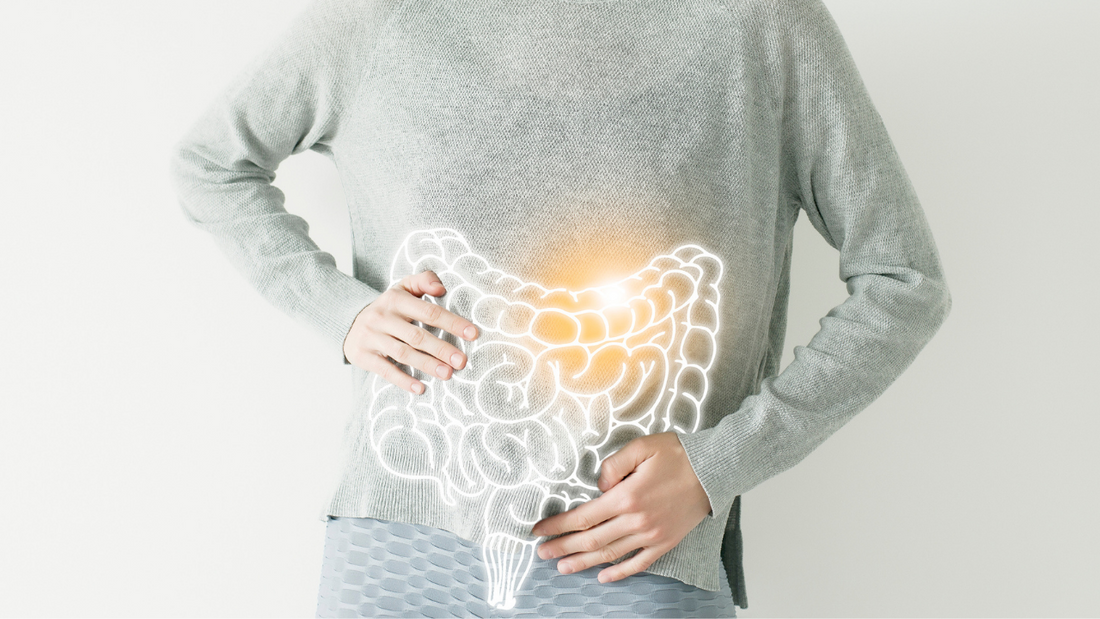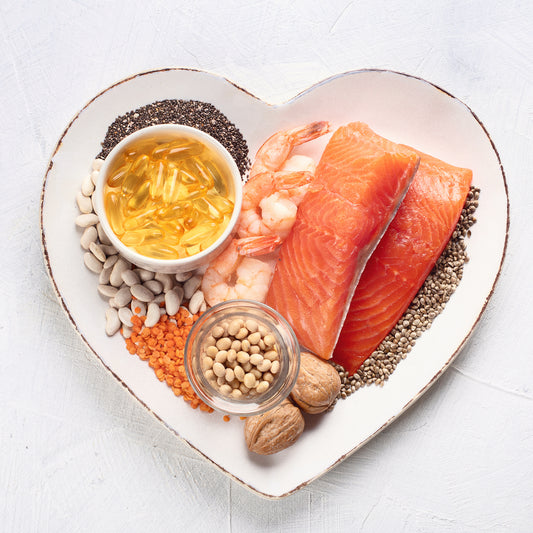Can Your Gut Health Affect Your Mental Health?

Did you know that your gut health can affect your mental health? In this blog, we’ll explain this connection, the bodily processes and systems involved, and ways you can support your gut health and, in turn, your mental health.
What is the gut-brain axis/connection, and how is it related to your mental health?
The gut and brain are highly connected, and their link is very complex. Communication happens in both directions (gut-brain and brain-gut) through the autonomic nervous system (ANS) and the endocrine HPA (hypothalamus/pituitary/adrenal) axis.
The ANS is responsible for bodily functions that we don’t voluntarily control, such as heart rate, breathing, blood flow, and digestion. The main function of the endocrine HPA axis is to control the body’s response to stress.
The communication between the ANS and the endocrine HPA is dependent on neurotransmitters such as serotonin, tryptophan, cortisol, epinephrine, and norepinephrine. [1]

Many of these neurotransmitters that are active in the brain are also active in the gut. A large proportion of the body’s feel-good hormone serotonin is produced in the gut, and 90% of serotonin receptors are located in there as well. [2]
Your gut microbes also produce the neurotransmitter gamma-aminobutyric acid (GABA), which helps control feelings of fear and anxiety. [3]
This gut-brain connection helps us understand how diet and mental health conditions are connected.
Why is the gut considered the “second brain”?
Have you ever experienced that feeling of butterflies in your stomach? It’s just your nerves. Believe it or not, the gut has more nerves than your spinal cord. This system of nerves in your gut is called the enteric nervous system, and it contains up to five times as many neurons as the spinal cord. [4]
The enteric nervous system is often referred to as the “second brain.” It helps the complex intricacies of digestion flow with little to no involvement from the actual brain.

The gut is connected to the brain by the vagus nerve. The feelings and moods we experience send signals from our brain to our digestive tract via the vagus nerve and vice versa.The vagus nerve controls much of our parasympathetic or “rest and digest” nervous system response. [5]
This connection between the gut and the brain means that the gut-brain axis is important in mental health, illnesses that affect the brain, and even digestive system conditions such as irritable bowel syndrome (IBS).
As previously mentioned, the bacteria in our gut play an important role in the production of neurotransmitters such as GABA, melatonin, and serotonin [6], which can impact our thoughts, moods, and feelings.
This indicates that there is a strong relationship between mental health conditions, such as depression and anxiety, and gastrointestinal symptoms, such as heartburn, indigestion, acid reflux, bloating, pain, constipation, and/or diarrhea. [7]
How does diet affect the connection between gut health and mental health?
A recent study looked at how the typical western diet affected the human microbiome and found that the environment in the gut is altered by the food we eat.Researchers specifically looked into the western diet, which often contains ultra-processed food, and found that the diet is linked with increased inflammation in the gut. [8]
There are ways to improve your gut health, and certain food items are particularly beneficial, especially to support your mental health.
There is a strong link between diet and gut health. Taking steps to avoid processed food, high-fat food, and refined sugars is important for maintaining a healthy microbiome (a community of beneficial bacteria in the body). These types of food are responsible for destroying good bacteria and promoting the growth of harmful bacteria.
A number of foods exist to help promote the growth of good bacteria, which you can include in a gut-brain connection diet, such as:

1. High-fibre foods
High-fibre foods, such as legumes, beans, peas, oats, bananas, berries, asparagus, and leeks, have been shown to improve gut health.[9] The western diet can make meeting your daily fibre needs challenging. It can be helpful to take a fibre supplement, but it’s important to note that not all fibre products are created equal.
2. Prebiotic foods
Prebiotics are nondigestible carbohydrates consumed by probiotics, allowing healthy bacteria to multiply in the gut. Prebiotics also help probiotics become more tolerant to the gut environment, such as pH and temperature changes. [10] Some examples of prebiotic foods include asparagus, bananas, garlic, Jerusalem artichokes, onions, and whole grains.
3. Fermented foods
Fermented foods are dietary sources of probiotics, and studies have found them to be beneficial to the gut microbiome. [11] Some examples of fermented foods include kimchi, sauerkraut, yogurt, tempeh, miso, and kefir. [12]

4. Collagen-boosting foods
Collagen is important in rebuilding and strengthening the lining of the intestinal wall and improving digestion. The digestive tract contains the amino acids glycine and glutamine, both essential for its repair. [13] Research has also shown that collagen peptides can improve the gut barrier. Collagen-rich foods include bone broth, fish, chicken, egg whites, citrus, berries, red and yellow vegetables, and garlic.
5. Omega-3-rich foods
Omega-3 fats are found in oily fish, such as salmon and are present in high quantities in the brain. Studies have found that omega-3s can improve gut health by influencing microbiome composition. [14] They have also demonstrated the ability to increase the growth of beneficial bacteria and reduce the growth of harmful bacteria. [15]
Takeaway
While research continues about the link between gut health and mental health, we need to know that gut health is incredibly important, and taking care of it can help us feel better overall.
References :
Jones MP, Dilley JB, Drossman D, et al. Brain–gut connections in functional GI disorders: Anatomic and physiologic relationships. Neurogastroenterol Motil. 2005; 18(2):91-103.
Yano JM, Yu K, Donaldson GP, et al. Indigenous bacteria from the gut microbiota regulate host serotonin biosynthesis. Cell. 2015; 161(2): 264-76.
Mazzoli R, & Pessione E. The neuro-endocrinological role of microbial glutamate and GABA signaling. Front Microbiol. 2016; 7:1934.
Furness JB, Callaghan BP, Rivera LR, et al. The enteric nervous system and gastrointestinal innervation: Integrated local and central control. Adv Exp Med Biol. 2014; 817:39-71.
- Breit, S., Kupferberg, A., Rogler, G., & Hasler, G. (2018). Vagus Nerve as Modulator of the Brain-Gut Axis in Psychiatric and Inflammatory Disorders. Frontiers in psychiatry, 9, 44.
2. Petra AI, Panagiotidou S, Hatziagelaki E, et al. Gut-microbiota-brain axis and its effect on neuropsychiatric disorders with suspected immune dysregulation. Clin Ther. 2015; 37(5):984-95.
3. Mussell M, Kroenke K, Spitzer RL, et al. Gastrointestinal symptoms in primary care: Prevalence and association with depression and anxiety. J Psychosom Res. 2008; 64(6):605-12.
4. Zinöcker MK, & Lindseth IA. The western diet-microbiome-host interaction and its role in metabolic disease. Nutrients. 2018; 10(3):365.
5. Parnell JA, & Reimer RA. Prebiotic fiber modulation of the gut microbiota improves risk factors for obesity and the metabolic syndrome. Gut Microbes. 2012; 3(1):29-34.
6. Markowiak P, & Śliżewska K. Effects of probiotics, prebiotics, and synbiotics on human health. Nutrients. 2017; 9(9):1021.
7. Alvaro E, Andrieux C, Rochet V, et al. Composition and metabolism of the intestinal microbiota in consumers and non-consumers of yogurt. Br J Nutr. 2007; 97(1):126-33.
8. Hemarajata P, & Versalovic J. Effects of probiotics on gut microbiota: Mechanisms of intestinal immunomodulation and neuromodulation. Therap Adv Gastroenterol. 2013; 6(1):39-51.
9. Chen Q, Chen O, Martins IM, et al. Collagen peptides ameliorate intestinal epithelial barrier dysfunction in immunostimulatory Caco-2 cell monolayers via enhancing tight junctions. Food Funct. 2017; 8(3):1144-51.
10. Menni C, Zierer J, Pallister T, et al. Omega-3 fatty acids correlate with gut microbiome diversity and production of N-cabamylglutamate in middle aged and elderly women. Sci Rep. 2017; 7(1):11079.
11. Robertson RC, Oriach CS, Murphy K, et al. Omega-3 polyunsaturated fatty acids critically regulate behaviour and gut microbiota development in adolescence and adulthood. Brain Behav Immun. 2017; 59:21-37.
 Free returns & exchanges
Free returns & exchanges



